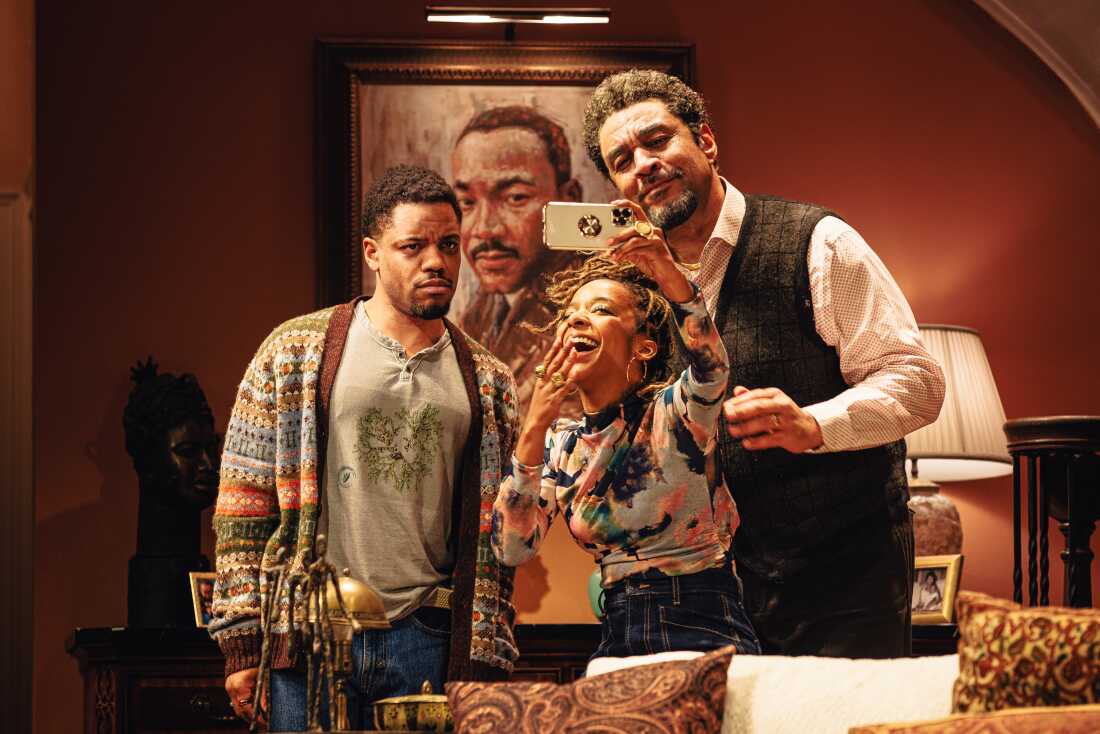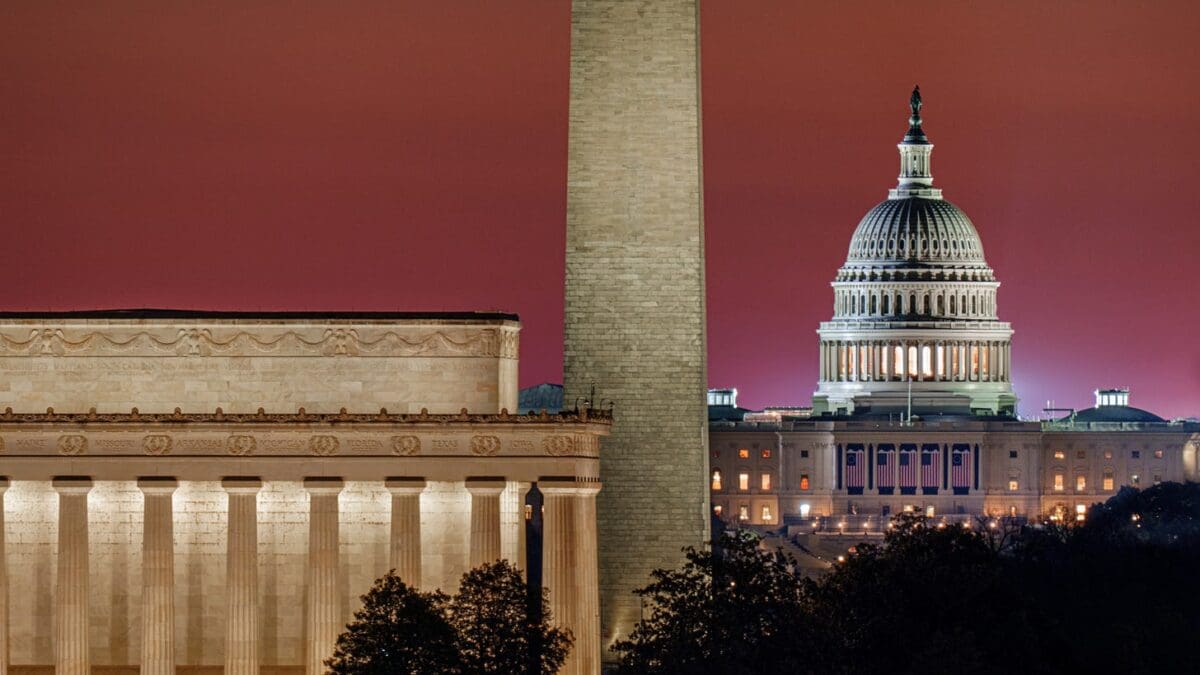
The Art Institute of Chicago Returned a Sculpture to Nepal But Obscured Its Connection to a Wealthy Donor
April 1, 2025
A civil rights leader’s family airs its dirty laundry on Broadway in ‘Purpose’
April 1, 2025IF YOU’RE A POPULIST DEMAGOGUE who leads a nationalistic, largely rural and exurban movement, winning power creates lots of risks and opportunities, not the least of which is living in a capital city. All over the world, cities tend to be more dynamic, cosmopolitan, and liberal than rural areas. In other words, not the aspiring populist demagogue’s home turf. This has been true for centuries. But it has its advantages, too, as both Donald Trump and Hungary’s Viktor Orbán are demonstrating right now.
Trump’s administration and his MAGA allies in Congress have waged war on Washington, D.C. and its institutions since before his return to power. In 2020, when Trump was still president, he decried “Democrat-run cities” as a major part of his “law and order” message.
Earlier this year Sen. Mike Lee and Rep. Andy Ogles introduced a bill that would end D.C.’s self-governing status. While the bill has not passed, Republicans did successfully use budget threats to coerce Mayor Muriel Bowser to dismantle the city’s Black Lives Matter Plaza near the White House, including removing the iconic yellow paint on the road, and announce plans to rename it. Georgia Rep. Andrew Clyde, who introduced legislation requiring BLM Plaza to be de-decorated and renamed, celebrated it as “making D.C. great again!”
Given that 44 percent of D.C.’s population is black and the district hasn’t given a Democratic presidential candidate less than 85 percent of the vote since 1992, the forced dismantling of a memorial established during the George Floyd and police brutality protests of 2020 sends a clear cultural message: Republicans aren’t going to tolerate a liberal, majority-minority city while they’re in charge.
Trump himself has held up D.C. as emblematic of what’s wrong with American cities, declaring in February that “I think we should take it over” in order to “make it safe.” Lauren Boebert recently snarked that D.C. might get the same renaming treatment as the Gulf of Mexico, offering “District of America” as a possibility.
Republicans have attacked the city’s universities as bastions of left-wing politics. During last year’s Gaza protests, several high-profile Republican House members tangled with students from George Washington University, with Rep. Boebert threatening that the school could “kiss your federal funding goodbye.”
More recently, U.S. Attorney for the District of Columbia Ed Martin threatened the Georgetown University Law Center, saying his office would not hire graduates from schools that didn’t terminate their DEI programs. Considering the central place of Georgetown Law in Washington political and professional life, the message was clearly meant to bring the capital city’s premier law school to heel. (The school’s dean told Martin, in not so many words, to sit down and shut up.)
Because the Constitution provides that the administration of the federal district is ultimately up to Congress, it’s easier for elected Republicans at the federal level to beat up on the city, its mayor and council, and its natives than it would be for them to bully, say, New York or Los Angeles or Chicago. But legal idiosyncrasies aren’t the only reason D.C. is a particular target for MAGA. Capital cities also happen to be where the power of the state is usually strongest. It’s no accident that, during the Lafayette Square protests in 2020, the federal government was able to assemble large numbers of trained, armed, organized, unidentifiable law enforcement officers—and helicopters—from several departments to mass against peaceful protesters at relatively short notice.
As a point of comparison, consider how Viktor Orbán’s government has recently moved to crack down on Budapest Pride, banning the event with legislation that also authorizes the use of facial recognition technology to punish individual march participants. The suppression of the annual march—the successor to the first pride march from behind the old Iron Curtain—is only the latest episode in Orbán’s culture war on the cosmopolitan and liberal Hungarian capital. Budapest’s diverse, forward-looking population defies the image of an ancient, culturally conservative Hungary that Orbán wants to impose.
Moreover, a pride march is a useful issue for Orbán, who likes to paint his opponents as foreign-influenced moral degenerates to heighten the contrast with his older, more socially conservative, rural base.
In response to Orbán’s attempt to suppress Budapest Pride, and the plans by his party to enshrine a ban on LGBTQ events in the country’s constitution, thousands of Hungarians protested in the center of Budapest, blocking major bridges and roads. On the one hand, it’s not clear what else they could do, but on the other, they create an image that Orbán, with his de-facto control of the media, can present as proof that Budapesti are a disruptive rabble. (Liberal Hungarians’ options are limited because there are no other cities in the country to rival the capital in size and importance; Americans have lots of options.)
Washington, D.C. is set to play host to WorldPride 2025. Whereas there’s been no attempt so far by Trump or the GOP to restrict the event, there has been a public debate among LGBTQ+ activists about whether D.C. is still the best location for this year’s celebration. It isn’t an unreasonable concern considering the U.S. government is now disappearing non-citizens, and Vice President JD Vance has expressed his opposition to same-sex marriage and endorsed “groomer” attacks on LGBTQ people. The government-services behemoth Booz Allen Hamilton has dropped its sponsorship of WorldPride in response to Trump’s executive order against DEI, citing concern for federal contracts.
Republicans attacks against D.C.’s universities echo Orbán’s years-long campaign to drive the Central European University out of Budapest. That campaign was basically successful, as the CEU, still one of the great institutions of the post-Cold War era, now conducts the bulk of its activities from its campus in Vienna.
The reality is that Washington, D.C. reflects much of the America that Trump and MAGA hate. It hosts some of the country’s premier universities—not least of which is Howard, perhaps the nation’s most famous HBCU. It is ethnically, religiously, and culturally diverse. Its streets hum with the good and bad of American urban life: business, art, ingenuity, homelessness, crime.
It’s not exactly clear how Boebert’s idea of replacing “District of Columbia” with “District of America” would be a cultural victory. “Columbia” is just an old way of referring to America—but maybe she thought it was “Colombia.” Or maybe the point is that, just as Orbán sees Budapest as somehow not Hungarian, MAGA sees D.C. as something not quite American.
Great Job Alan Elrod & the Team @ The Bulwark Source link for sharing this story.





